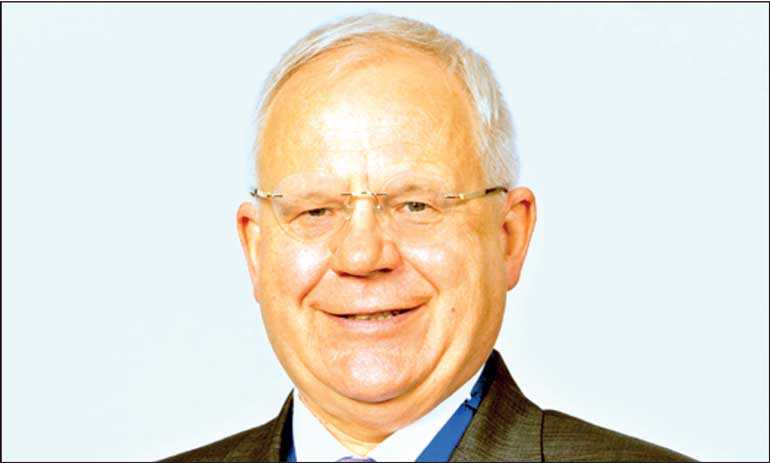Thursday Feb 19, 2026
Thursday Feb 19, 2026
Wednesday, 20 February 2019 00:00 - - {{hitsCtrl.values.hits}}

Steven Swientozielskyj, the Global President of The Chartered Institute of Management Accountants (CIMA) says CIMA is committed to deliver finance professionals who can harness the full power of technology and data to create and add organisational value and today the CIMA Professional Qualification is recognised around the world as the most relevant finance program for business professionals. CIMA this year marks 100 years as a global management accounting body and has over 227,000 members and students around the world.
Following are excerpts of an interview with Swientozielskyj:
By Cathrine Weerakkody

Q: As the President of The Chartered Institute of Management Accountants (CIMA) what have you achieved during your tenure as president? What remains to be done?
A: We mark the Institute’s 100th anniversary. Today we have over 227,000 members and students, with Sri Lanka hosting the largest concentration of Chartered Global Management Accountants (CGMAs) outside of the UK and USA. In the past eight months, I have travelled around the world to engage with members, students and get to know what they need from CIMA. I have also met with regulatory, academic and business organisations – this has been quite eye-opening and has helped us better understand emerging business needs and the new skills necessary for management accountants to succeed today and into the future. Building on 100 years of heritage and our innovative Future of Finance research, we are in an excellent position to support our members and students to go beyond in this digital future.
Q: How has the role of the management accountant changed over the last 10 years?
A: Over the last decade, businesses have undergone dramatic change. Technology is disrupting not only the products they offer but also the way they earn a profit, moving from the manufacturing of tangible goods to service-based business models and knowledge-related activities sold via licensees and subscriptions. At the same time, technologies, such as robotics and computer algorithms, are taking over basic routine functions and providing companies with more information and data on their markets, their customers, their suppliers and their own organisation.
Companies now need to figure out how to utilise a goldmine of financial and non-financial information accurately and holistically to drive their strategy and be forward thinking. And these developments are opening up opportunities for finance professionals to redefine their roles as business partners and value creators. This is certainly challenging, but where there is a change there is an opportunity, and the finance function now has a clear mandate to go beyond its core accounting and governance role to become more influential. It calls for finance to move from being a technical function, mainly focused on budgeting, planning, and reporting, to being a business partner and enabler that create values by combining their skillsets as management accountants with emerging technology solutions.
Q: What are the benefits of the CIMA program and how does the program stand out from other professional programs?
A: I have worked across a range of industries, sectors, and companies, and over the years I have noticed that many roles in business and finance have become more narrowly focused. At the same time, there is a greater need for management accountants to understand the impact of business decisions on a wider group of stakeholders and the environment in which their organisation’s business model operates. The CIMA Professional Qualification is recognised around the world as the most relevant finance program for professionals seeking a career in business.
As our students progress through each level of the examinations, they develop key technical skills and competencies such as critical thinking, decision-making, leadership and communications skills. In addition, last month we updated the CIMA Professional Qualification syllabus to address new areas such as digital business models, cyber risks, data analytics tools, and emerging technologies. We also develop our students’ growth mindsets, so that they can readily adapt to new roles, learn new skills and remain attractive to employers in a digital business world.
Q: What is your current strategy to ensure sustained membership growth?
A: For 100 years, we have empowered our members to take their organisations beyond expectations, and – in this era of accelerating disruption – their success remains our highest priority. As an organisation, we are working harder than ever to give our members and students what they need to stay ahead and employers the competent talent they require. We regularly update our qualifications, release new thought leadership, courses, events and other learning resources to equip them with the skills required by businesses. We work closely with employers, politicians, policymakers and regulators across the world to drive recognition of the enormous value management accountants to bring to businesses and society as a whole.
Through the Association of International Certified Professional Accountants, the body CIMA formed with the American Institute of CPAs (AICPA) to serve the accounting profession worldwide, we also have strong local member networks and offices across 184 countries dedicated to supporting our members’ professional needs.
Q: What is the biggest challenge facing CIMA and how do you plan to overcome it?
A: New technologies, demographic shifts, market upheaval and evolving customer expectations are impacting business models and forcing organisations to rethink how they operate. Standing still isn’t an option – businesses need to adapt and finance professionals need to become value creators, acquire new digital skills and adopt a new growth mindset.
Q: What aspects of the CIMA brand are you currently working to strengthen and how?
A: The CIMA Centenary and the Future of Finance are anchor points for building the brand this year and as we move into the years ahead. The CIMA Centenary is about respecting our heritage and embracing our future. The Future of Finance is the platform we are using to future-proof the profession, so it drives us into the next 100 years. Building on our rich heritage, we are working to deliver a wider range of benefits that meet the professional challenges of today’s disruptive world. Our researchers produce break-through thought leadership for members to access on emerging areas of business and finance.
From this, we develop member-focused materials, such as our insightful Future of Finance research, as well as content for the CGMA Store and CPD resource centre to equip members with the skills and competencies they need in today’s world and for the future. In turn, this drives employability and provides economies with the talent they need to move forward.
Q: In your opinion, what level of support is CIMA providing for its international members and students?
A: CIMA is committed to supporting members and students across the entirety of their careers from new entrants to the world of work through to CFOs and Chief Executives. We work hard every day to help them stay ahead of the pack, providing them with the latest research, thought leadership, a careers job board and a library of leading-edge resources to help them stay ahead, employable and competent for a digital world. This includes: Access to reports and thought leadership research, which provides the insights needed to succeed in a digital age, analysis on the future of the profession and guidance on changing the skills needed for the new world of finance.
Q: What are the opportunities that technology will bring to reimagine the CFO’s role to add value in new ways to their organisations?
A: The rapid pace of change in today’s business environment means CFOs can no longer rely on crunching numbers and focusing solely on a company’s balance sheet and financial governance. They must shift their focus towards analytics, using the data at their disposal to ensure business decisions effectively enable innovations and create value. Our own research on the Future of Finance has found that a digitally savvy CFO and finance function can enhance the agility of the business by providing a trusted source of information and a strategic overview. To enable innovation, CFOs must master the art of data storytelling, communicating data insights to the whole business to inform strategic decisions. Business partnering is becoming a crucial part of a CFO’s role too.
Q: On a final note, CIMA celebrates 100 years in March. What would the next 10 years look like for CIMA, globally?
A: Corporations today are lucky if they even surpass 15 years, and most successful organisations have an average lifespan of 90 years. We are thrilled to have gone past that and reached 100 years. There is a reason we have existed for so long; throughout the years we have adapted to change while continuing to lead those working in finance into the future. However, now is a great time to reflect on our past, and to focus on the future of the profession. We remain committed to equipping our members and students with the skills and competencies they need to embrace new opportunities and deliver prosperity across the world for themselves, their organisations and their communities today and in the future.
(The writer is a graduate in financial analysis and an Associate of CIMA and has a Master’s Degree in Financial Management and currently reading for a PhD in England.)